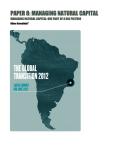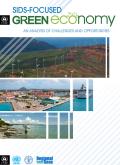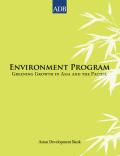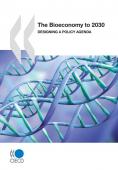
The natural world has a lot to teach us. Above all, it teaches us about systems and cycles; that altering one component of a system, however small, can have wider implications within and beyond a given cycle. Human society, the planet and the economy are all systems and are all bound together in intricate relationships. Only when we begin to understand this bigger picture can we tackle the systemic problems facing us. Here we take a short journey through planetary science to grasp some of the dimensions of those relationships, and posit a series of solutions for affecting the kind of systemic transformation that we urgently need to ensure the health of the planet and of people.
Economic theory (and common sense) tells us that when something is valuable, and it is free, its use tends to infinity – this explains why trees, biodiversity, freshwater and atmospheric space for carbon are all being used ‘like there is no tomorrow’. It also assumes that when something is exhausted (or too expensive), a substitute is almost certain to be found.
Three different sets of approaches to understanding behaviour with respect to sustainable tourism mobility and consumption are identified in this paper: the utilitarian, social/psychological and the systems of provision/institutional approach. Each is based on different sets of assumptions on the factors that affect consumer sustainability behaviour. These assumptions not only affect the selection of policy tools to change behaviours but are also related to different modes of governance. Assumptions with respect to human behaviour and behavioural change and modes of intervention and governance are interrelated and mutually reinforcing and act as policy paradigms. Failure to recognise the importance of social structures in affecting behaviour has created a path dependency in which solutions to sustainable tourism mobility are only accepted within the dominant governance and behavioural paradigm. Other policy options and academic research that identify structures and institutions in systems of provision as a sustainability problem that requires non-market intervention and/or significant system change are regarded as marginal to the policy process or are ignored.


This paper assesses some welfare consequences of climate change mitigation policies. In the same vein as Becker, Philipson and Soares (2005), a simple index of economic progress weighs in the monetary cost induced by mitigation policies as well as the health benefits arising from the reduction in local air pollution. The shadow price of pollution is calculated indirectly through its impact on life expectancy. Taking into account the health benefits of mitigation policies significantly reduces their monetary cost in China and India, as well as in countries with large fossil-based energy-producing sectors (Australia, Canada and the United States).
A key challenge for humanity over the coming decades will be to meet the energy, land, water and material needs of up to nine billion people, while keeping climate change, biodiversity loss and health threats within acceptable limits. The International Resource Panel (IRP) is examining ways of achieving decoupling of economic growth from resource use and environmental degradation by improving water productivity and measurement frameworks. This report covers the analytical methods and policy frameworks needed to ensure that water use can be properly quantified over its life cycle and integrated into decoupling measures within the green economy.
The paper examines methodologies for quantifying water use and environmental impacts, their underlying assumptions and the context in which they can be effectively used. The paper finds that:
•water registers provide a key to the fair distribution of access to water;
•accounting can provide governments with knowledge of how water is linked to the economy and human wellbeing;
•water footprint assessment can provide a tool for awareness raising to highlight water issues in production and consumption;
This book presents the research and analysis carried out during the first phase of the OECD Project on Sustainable Manufacturing and Eco-innovation. Its aim is to provide benchmarking tools on sustainable manufacturing and to spur eco-innovation through better understanding of innovation mechanisms. It reviews the concepts and forms an analytical framework; analyses the nature and processes of eco-innovation; discusses existing sustainable manufacturing indicators; examines methodologies for measuring eco-innovation; and takes stock of national strategies and policy initiatives for eco-innovation. This book is part of the OECD Innovation Strategy and is also one of the first contributions to the OECD Green Growth Strategy.
The taxation of different sources and uses of energy (particularly those that give rise to emissions of greenhouse gases) will play a key role in governments’ efforts to mitigate the scale of global warming and climate change. At present, effective tax rates vary widely across different sources and uses of energy within countries, as well as across countries. This publication provides the first systematic statistics of such effective tax rates - on a comparable basis - for each OECD country, together with ‘maps’ that illustrate graphically the wide variations in tax rates per unit of energy or per tonne of CO2 emissions. These statistics and maps should be an invaluable tool for policymakers, analysts and researchers considering both domestic fiscal reform in response to climate change and other environmental challenges (e.g. to achieve emissions reductions targets most cost-effectively) and wider international responses.

The biological sciences are adding value to a host of products and services, producing what some have labelled the “bioeconomy”. From a broad economic perspective, the bioeconomy refers to the set of economic activities relating to the invention, development, production and use of biological products and processes. If it continues on course, the bioeconomy could make major socioeconomic contributions in OECD and non-OECD countries. These benefits are expected to improve health outcomes, boost the productivity of agriculture and industrial processes, and enhance environmental sustainability. The bioeconomy’s success is not, however, guaranteed: harnessing its potential will require coordinated policy action by governments to reap the benefits of the biotechnology revolution.
This publication presents the OECD Innovation Strategy, the culmination of a three-year, multidisciplinary and multistakeholder effort. It provides analysis and policy guidance on a broad range of issues from education and training policies, to policies that provide a conducive business environment and infrastructure for innovation, to policies that foster the creation and diffusion of knowledge. It can support government efforts to develop effective innovation strategies and to achieve key economic and social objectives. It advocates an approach which takes into account the interplay of different policy domains and brings them together through supportive mechanisms for governance at the local, regional, national and international levels.
